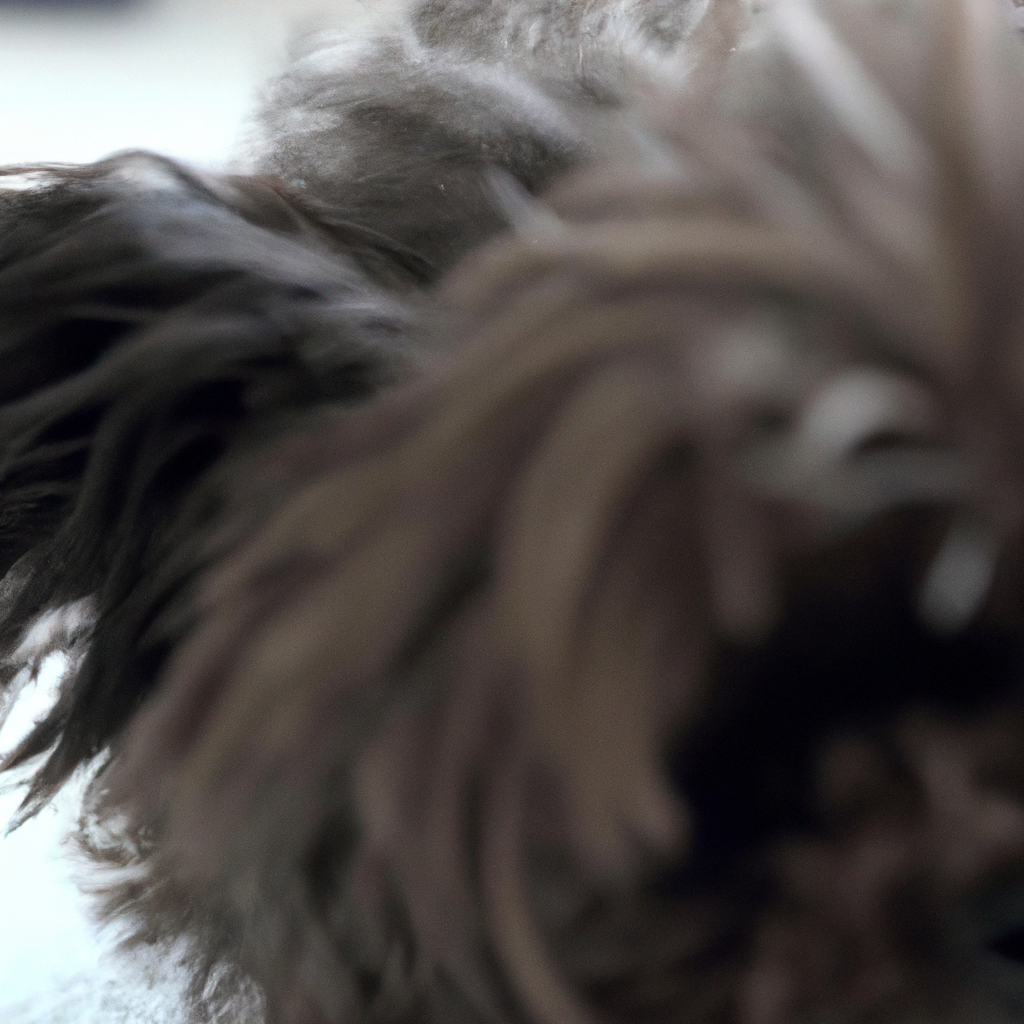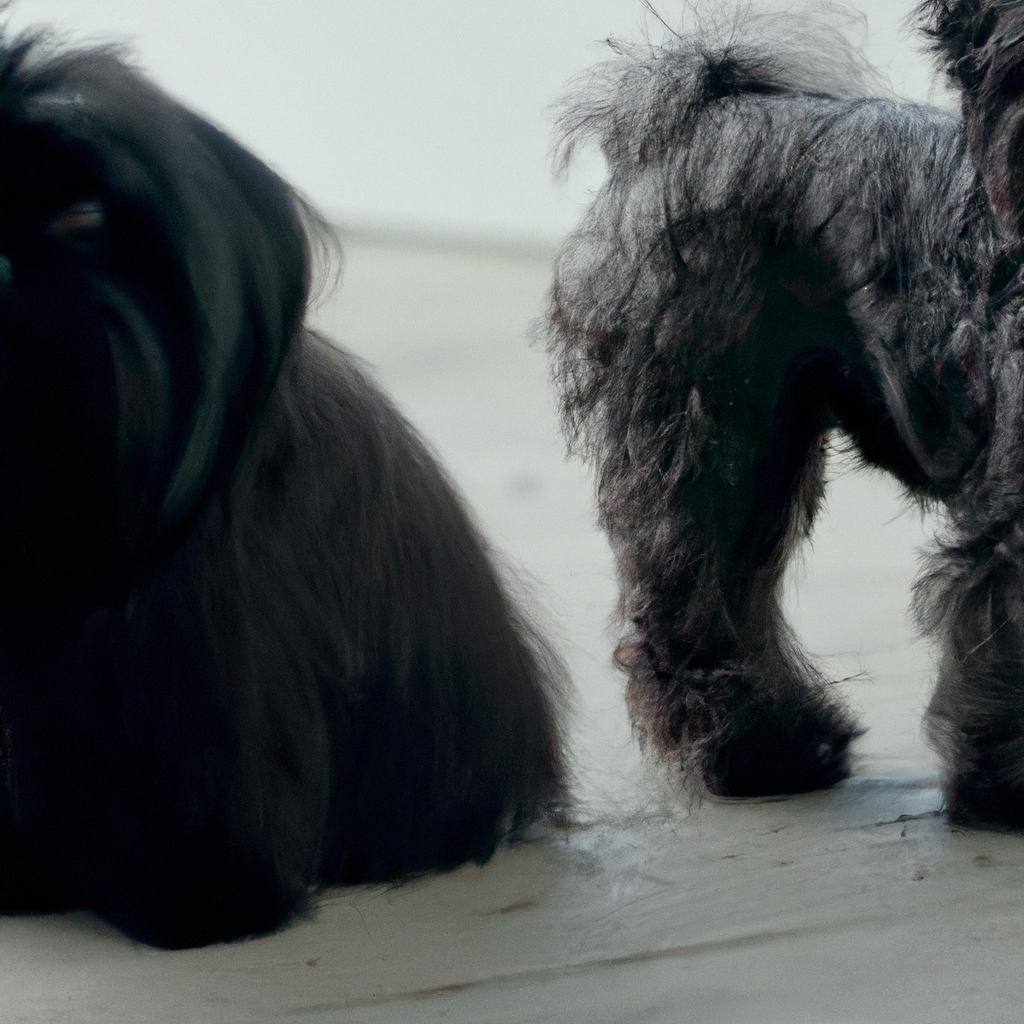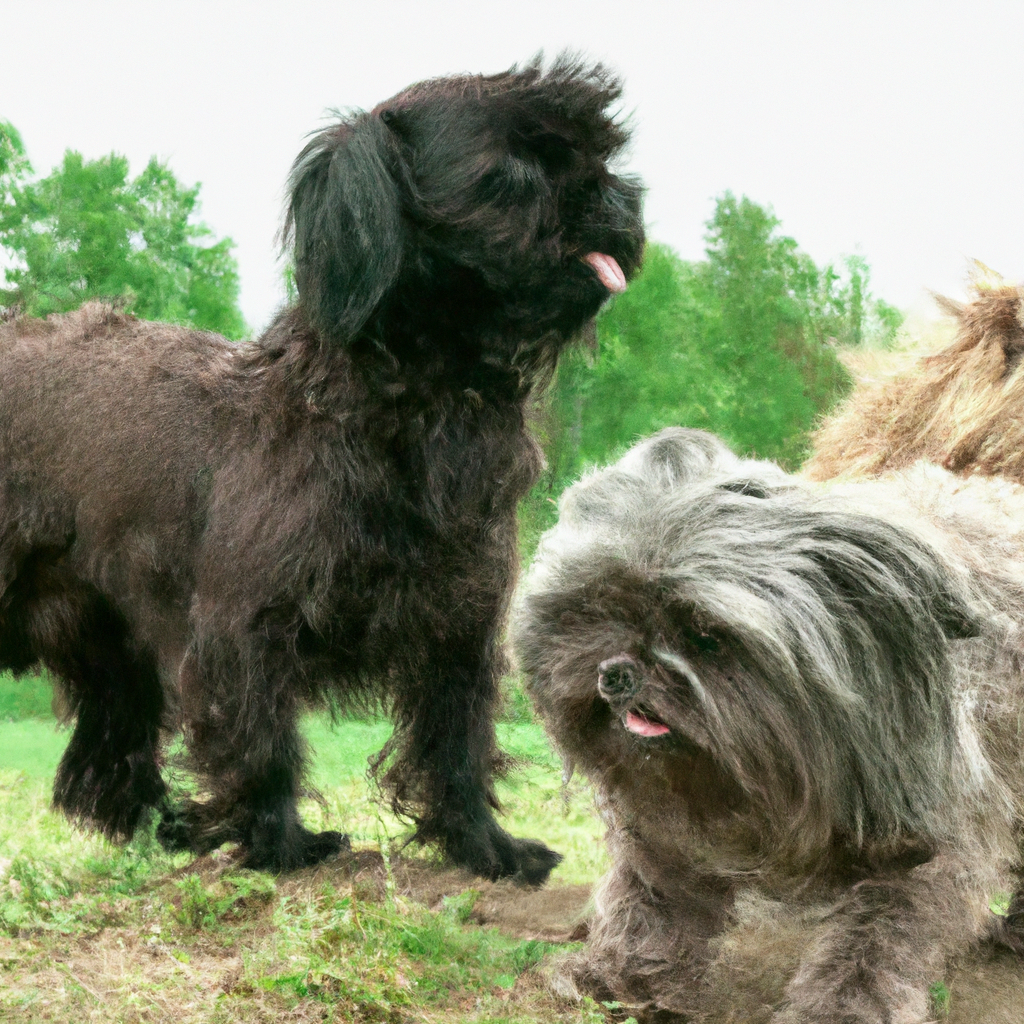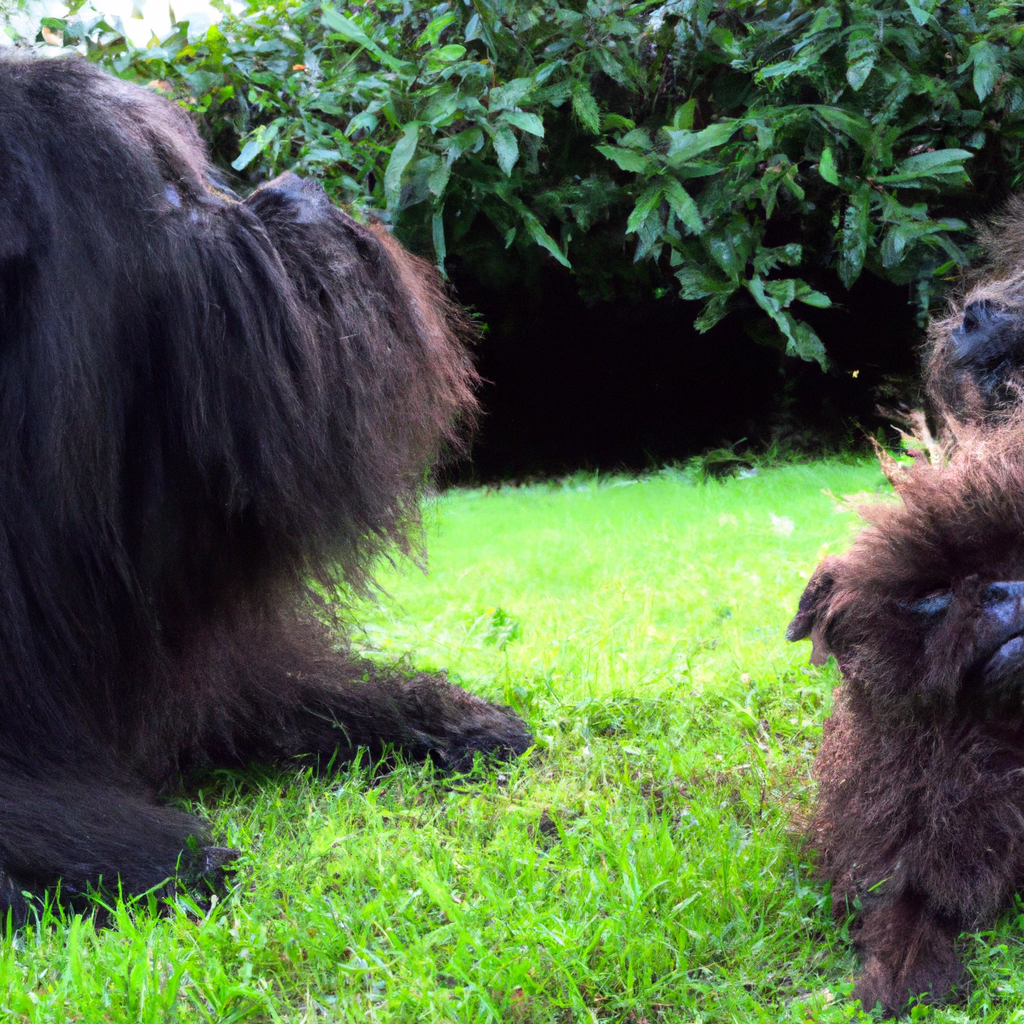Affenpinscher, like other toy breeds, are prone to certain health issues due to their small size and specific breed characteristics. While they are generally healthy dogs, they can suffer from conditions such as hip dysplasia, heart problems, and respiratory issues. Compared to other toy breeds, Affenpinschers may have a higher risk of certain eye problems, such as cataracts and glaucoma. They are also more likely to experience dental issues due to their small mouth size. However, with regular veterinary care and a healthy lifestyle, these health issues can be managed effectively.
Comparing Affenpinscher and Other Toy Breeds: Common Health Issues
The Affenpinscher, also known as the “Monkey Terrier,” is a small but feisty breed that is often compared to other toy breeds due to its size and playful nature. However, when it comes to health issues, the Affenpinscher has a unique set of concerns that sets it apart from its toy breed counterparts.
To begin with, the Affenpinscher is known for its brachycephalic or “short-nosed” facial structure. This characteristic, while endearing, can lead to a host of respiratory problems. Affenpinschers often struggle with brachycephalic syndrome, which can cause difficulty breathing, snoring, and in severe cases, collapse. This is a common issue among other brachycephalic breeds like the Pug and the Bulldog, but it’s particularly prevalent in the Affenpinscher due to its small size.
In contrast, other toy breeds such as the Chihuahua and the Yorkshire Terrier, which have longer snouts, are less prone to these respiratory issues. However, they have their own set of health concerns. For instance, these breeds are more susceptible to dental problems due to their small mouths and crowded teeth. Regular dental check-ups are a must for these breeds to prevent tooth decay and gum disease.
Another health issue that is common among Affenpinschers is hip dysplasia. This condition, which involves an abnormal formation of the hip socket, can lead to pain and mobility issues. While hip dysplasia is common in many larger breeds, it’s somewhat unusual to see it in a toy breed like the Affenpinscher. On the other hand, other toy breeds like the Pomeranian and the Maltese are more likely to suffer from patellar luxation, a condition where the kneecap dislocates or moves out of its normal position.
Eye problems are another area where the Affenpinscher differs from other toy breeds. Affenpinschers are prone to a variety of eye conditions, including cataracts, glaucoma, and progressive retinal atrophy (PRA). These conditions can lead to vision loss if not treated promptly. In comparison, other toy breeds like the Shih Tzu and the Pekingese are more prone to eye injuries due to their prominent eyes, but they are less likely to suffer from the genetic eye conditions that afflict the Affenpinscher.
Despite these health issues, it’s important to remember that every dog is an individual and not all Affenpinschers or other toy breeds will suffer from these conditions. Regular vet check-ups, a balanced diet, and plenty of exercises can go a long way in keeping your toy breed healthy.
In conclusion, while the Affenpinscher shares some common health issues with other toy breeds, it also has a unique set of concerns due to its brachycephalic facial structure and predisposition to certain eye conditions. However, with proper care and regular veterinary attention, these adorable little dogs can lead happy and healthy lives. Whether you’re considering an Affenpinscher or another toy breed, it’s important to be aware of these potential health issues so you can provide the best possible care for your furry friend.
Understanding Heart Diseases in Affenpinschers and Other Toy Breeds
The world of toy breeds is a fascinating one, filled with pint-sized pups that pack a punch in terms of personality. Among these, the Affenpinscher, with its distinctive monkey-like face and playful demeanor, holds a special place in the hearts of many dog lovers. However, like other toy breeds, the Affenpinscher is not without its share of health issues, particularly heart diseases.
Heart diseases in dogs, much like in humans, can be a serious concern. They can range from congenital conditions, present at birth, to acquired ones that develop over time. In Affenpinschers and other toy breeds, the most common heart conditions are Mitral Valve Disease (MVD) and Patent Ductus Arteriosus (PDA).
MVD is a degenerative disease that affects the mitral valve of the heart. This valve separates the left atrium and ventricle, and when it doesn’t function properly, it can lead to congestive heart failure. Toy breeds, including the Affenpinscher, are particularly susceptible to MVD, with the onset typically occurring in middle to old age.
On the other hand, PDA is a congenital heart defect that can affect Affenpinschers and other toy breeds. This condition involves an abnormal blood vessel that allows blood to bypass the lungs, leading to a lack of oxygen in the body. If left untreated, PDA can result in heart failure.
While these conditions may sound daunting, it’s important to remember that early detection and treatment can significantly improve a dog’s prognosis. Regular veterinary check-ups are crucial in identifying any potential heart issues. Veterinarians can use a variety of diagnostic tools, such as echocardiograms and X-rays, to assess a dog’s heart health.
Moreover, maintaining a healthy lifestyle for your Affenpinscher or other toy breed can also help prevent heart diseases. This includes a balanced diet, regular exercise, and avoiding obesity, which can put additional strain on the heart.
In addition to these preventive measures, advancements in veterinary medicine have led to a range of treatment options for heart diseases in dogs. For instance, MVD can often be managed with medication that helps the heart function more efficiently. In the case of PDA, surgery is usually required, but the success rate is high, and most dogs go on to lead normal, healthy lives post-surgery.
It’s also worth noting that responsible breeding practices can help reduce the incidence of congenital heart diseases like PDA. Reputable breeders will screen their dogs for these conditions before breeding, thereby minimizing the risk of passing them on to the puppies.
In conclusion, while Affenpinschers and other toy breeds may be predisposed to certain heart diseases, these conditions are by no means a certainty. With regular veterinary care, a healthy lifestyle, and responsible breeding practices, these adorable little dogs can enjoy long, happy lives. So, if you’re the proud owner of an Affenpinscher or any other toy breed, remember to keep their heart health in check. After all, these small dogs have big hearts that deserve the best care we can give them.
Dental Health Problems: Affenpinscher vs Other Toy Breeds
When it comes to dental health problems, the Affenpinscher, a small but sturdy toy breed, has a unique set of challenges compared to other toy breeds. Known for their distinctive “monkey-like” faces and playful personalities, Affenpinschers are a beloved breed. However, their compact jaw structure can lead to a variety of dental health issues that are less common in other toy breeds.
Affenpinschers, like many small breeds, are prone to periodontal disease. This is a condition where plaque and tartar build-up leads to inflammation and infection of the gums. If left untreated, it can result in tooth loss and even damage to the heart, liver, and kidneys. The Affenpinscher’s small mouth and crowded teeth make it particularly susceptible to this condition. Regular brushing and professional dental cleanings are essential to prevent periodontal disease in these little dogs.
In contrast, other toy breeds such as the Chihuahua or the Yorkshire Terrier, while also prone to periodontal disease, often have slightly larger jaws and less crowded teeth. This makes it easier to maintain their dental health with regular brushing and cleanings. However, these breeds are not without their own unique dental challenges. For instance, Chihuahuas are known for their susceptibility to dental caries, a condition that causes cavities and tooth decay.
Another common dental issue in Affenpinschers is malocclusion, or misalignment of the teeth. This can occur when the dog’s jaw is either too small or too large for its teeth, causing them to grow in at odd angles or become crowded. Malocclusion can lead to difficulty eating, pain, and even injury to the mouth or gums. In severe cases, surgery may be required to correct the problem.
On the other hand, breeds like the Pomeranian or the Papillon, while they can also experience malocclusion, are more often affected by tooth loss. This is typically due to the fact that their teeth are often smaller and more fragile, making them more prone to breakage and decay.
Despite these challenges, it’s important to remember that dental health issues in Affenpinschers and other toy breeds are not inevitable. With regular dental care, including brushing, cleanings, and check-ups, these problems can often be prevented or managed effectively. It’s also crucial to provide a balanced diet that supports dental health, and to avoid giving your dog hard objects to chew on that could damage their teeth.
In conclusion, while Affenpinschers and other toy breeds each have their own unique set of dental health challenges, they share a common need for regular, attentive dental care. Whether you’re the proud owner of an Affenpinscher, a Chihuahua, or a Pomeranian, keeping a close eye on your dog’s dental health can help ensure they live a long, happy, and healthy life. After all, a healthy mouth is a key part of overall health for dogs of all sizes and breeds.
Eye Disorders in Affenpinscher and Other Toy Dog Breeds
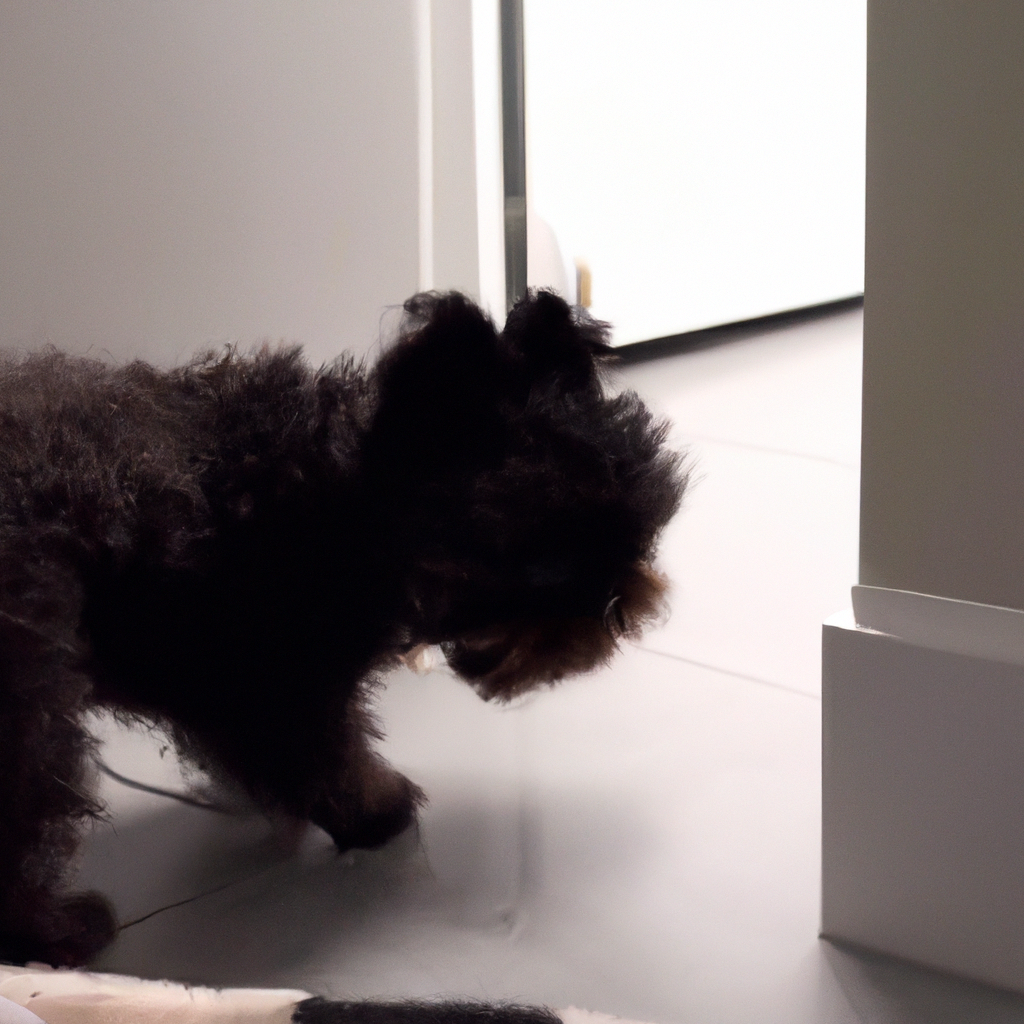
The Affenpinscher, a small but mighty breed, is known for its distinctive, almost human-like face and playful demeanor. However, like many other toy breeds, the Affenpinscher is prone to certain health issues, particularly eye disorders. This is a common trait among toy breeds, and it’s important for potential owners to be aware of these potential health risks.
Eye disorders in Affenpinschers and other toy breeds can range from minor irritations to serious conditions that may require surgical intervention. One of the most common eye disorders in these breeds is Progressive Retinal Atrophy (PRA). This is a group of genetic diseases that cause the retina to deteriorate over time, leading to impaired vision and, in severe cases, blindness. PRA is particularly prevalent in Affenpinschers, but it can also affect other toy breeds.
Another common eye disorder in Affenpinschers and other toy breeds is cataracts. This condition is characterized by a clouding of the lens in the eye, which can lead to blurred vision and, if left untreated, can cause blindness. Cataracts can be caused by a variety of factors, including age, diabetes, and trauma, but they are also known to be hereditary in certain breeds.
Glaucoma is another eye disorder that can affect Affenpinschers and other toy breeds. This condition is caused by increased pressure in the eye, which can damage the optic nerve and lead to vision loss. Glaucoma can be particularly challenging to manage in toy breeds due to their small size, which can make treatment more difficult.
Dry eye, or Keratoconjunctivitis Sicca (KCS), is another common eye disorder in Affenpinschers and other toy breeds. This condition is characterized by a decrease in tear production, which can lead to dry, irritated eyes and, if left untreated, can cause damage to the cornea.
While these eye disorders can be concerning, it’s important to note that with regular veterinary care and early detection, many of these conditions can be managed effectively. Regular eye exams are crucial for early detection and treatment of these disorders. Additionally, potential owners of Affenpinschers and other toy breeds should research the breed’s health history and consider genetic testing to identify potential risks.
In conclusion, while Affenpinschers and other toy breeds are known for their charming looks and playful personalities, they are also prone to a variety of eye disorders. These can range from minor irritations to serious conditions that can impact the dog’s quality of life. However, with regular veterinary care, early detection, and appropriate treatment, many of these conditions can be effectively managed. As always, potential owners should be fully aware of the health risks associated with their chosen breed and be prepared to provide the necessary care. After all, these small but mighty companions are worth every bit of the effort.
Orthopedic Issues: A Comparison between Affenpinscher and Other Toy Breeds
The Affenpinscher, also known as the “Monkey Terrier,” is a small but feisty breed that is loved for its distinctive appearance and lively personality. However, like many toy breeds, the Affenpinscher is not without its share of health issues, particularly in the realm of orthopedics. When compared to other toy breeds, the Affenpinscher presents a unique set of challenges and considerations.
Orthopedic issues are common in many small dog breeds due to their compact size and delicate bone structure. These issues can range from minor conditions that cause discomfort to severe problems that can significantly impact a dog’s quality of life. In the case of the Affenpinscher, one of the most common orthopedic issues is patellar luxation, a condition where the kneecap dislocates or moves out of its normal position. This condition can cause pain, lameness, and in severe cases, can lead to arthritis or even a permanent change in gait.
In contrast, other toy breeds such as the Chihuahua or the Pomeranian are more prone to conditions like hip dysplasia and Legg-Calve-Perthes disease. Hip dysplasia is a genetic condition where the hip joint doesn’t fit together properly, leading to wear and tear that can cause pain and arthritis. Legg-Calve-Perthes disease, on the other hand, is a condition that affects the hip joint of young dogs, causing a decrease in blood supply to the head of the femur bone, leading to its disintegration.
While these conditions are more common in other toy breeds, they are not unheard of in Affenpinschers. However, the prevalence of patellar luxation in Affenpinschers does set them apart. This is likely due to the breed’s unique skeletal structure, which features a short, square build with a deep chest and a level back. This structure, while giving the Affenpinscher its distinctive appearance, may also predispose the breed to certain orthopedic issues.
Despite these potential health issues, it’s important to remember that not all Affenpinschers will develop orthopedic problems. Many live long, healthy lives with no significant health issues. However, potential Affenpinscher owners should be aware of these risks and be prepared to provide their pet with the necessary care and attention.
Preventive measures such as regular vet check-ups, a balanced diet, and appropriate exercise can go a long way in maintaining an Affenpinscher’s orthopedic health. Additionally, if you’re considering getting an Affenpinscher from a breeder, it’s crucial to ensure that they are reputable and prioritize the health of their dogs. Reputable breeders will screen their breeding dogs for common health issues and will be transparent about their dogs’ health histories.
In conclusion, while the Affenpinscher does face a unique set of orthopedic challenges compared to other toy breeds, these issues are manageable with the right care and attention. By being aware of these potential health issues and taking the necessary preventive measures, you can ensure that your Affenpinscher lives a long, healthy, and happy life.
Skin Conditions in Affenpinscher and Other Toy Breeds: A Comprehensive Study
The Affenpinscher, also known as the “Monkey Terrier,” is a small but feisty toy breed known for its distinctive, almost human-like face and playful personality. However, like many other toy breeds, the Affenpinscher is prone to certain health issues, particularly skin conditions. This article aims to provide a comprehensive study of these issues, comparing the Affenpinscher with other toy breeds.
Skin conditions in dogs can range from minor irritations to serious diseases that require extensive treatment. In Affenpinschers, one of the most common skin conditions is atopic dermatitis, an inflammatory, chronic skin disease associated with allergies. These allergies can be triggered by a variety of factors, including dust mites, pollen, and certain foods. Affenpinschers with atopic dermatitis may exhibit symptoms such as itching, redness, and skin infections.
Interestingly, atopic dermatitis is also common in other toy breeds. For instance, the Shih Tzu and the Bichon Frise are known to suffer from this condition. However, the prevalence of atopic dermatitis in these breeds may be slightly higher than in the Affenpinscher. This could be due to the longer, denser coats of these breeds, which can trap allergens more easily and exacerbate skin irritation.
Another skin condition that can affect the Affenpinscher is pyoderma, a bacterial infection that causes pustules on the skin. This condition is often secondary to other issues, such as allergies or hormonal imbalances. While pyoderma can affect any breed, it seems to be more common in toy breeds, including the Affenpinscher. This may be due to their smaller size, which can make them more susceptible to skin injuries and infections.
In comparison, the Pomeranian, another popular toy breed, is prone to a unique skin condition known as alopecia X. This condition, which is characterized by hair loss and darkening of the skin, does not typically affect the Affenpinscher. The exact cause of alopecia X is unknown, but it is thought to be related to hormonal imbalances.
Despite these breed-specific differences, it’s important to note that all dogs, regardless of breed, can develop skin conditions. Factors such as diet, environment, and overall health can all play a role in a dog’s skin health. Therefore, regular veterinary check-ups and proper grooming are essential for all breeds, including the Affenpinscher.
In conclusion, while the Affenpinscher and other toy breeds may be predisposed to certain skin conditions, many of these issues can be managed with proper care and treatment. If you own an Affenpinscher or are considering adopting one, it’s important to be aware of these potential health issues. Regular vet visits, a balanced diet, and proper grooming can go a long way in keeping your Affenpinscher’s skin healthy. And remember, while Affenpinschers may be small in size, they have big personalities and can bring a lot of joy and companionship to your life.
Digestive Health Problems in Affenpinscher and Other Toy Breeds
The Affenpinscher, also known as the “Monkey Terrier,” is a small but feisty breed known for its distinctive, almost human-like face and playful personality. Like other toy breeds, the Affenpinscher is a popular choice for those seeking a compact, affectionate, and lively companion. However, despite their small size and charming demeanor, Affenpinschers and other toy breeds are not exempt from health issues, particularly those related to digestion.
Digestive health problems are common in toy breeds, including the Affenpinscher. This is due in part to their small size, which can make them more susceptible to certain conditions. For instance, toy breeds often have smaller, more delicate digestive systems, which can be more easily upset or damaged. This can lead to a range of issues, from minor concerns like indigestion or constipation to more serious conditions like pancreatitis or gastroenteritis.
One common digestive issue in Affenpinschers and other toy breeds is dental disease. Due to their small mouths, these breeds often have crowded or misaligned teeth, making them more prone to dental problems. These can include periodontal disease, which can lead to tooth loss and can also affect the dog’s overall health, including its digestive system. Bacteria from the mouth can enter the bloodstream and affect the heart, kidneys, and liver, organs that play a crucial role in digestion.
Another common issue is dietary intolerance or allergies. Like humans, dogs can be sensitive to certain foods, leading to digestive upset. Symptoms can include vomiting, diarrhea, and loss of appetite. It’s important to note that these symptoms can also be signs of more serious conditions, so it’s crucial to consult with a vet if your Affenpinscher or other toy breed is showing signs of digestive distress.
Toy breeds, including the Affenpinscher, are also more prone to developing pancreatitis, an inflammation of the pancreas that can affect digestion. This condition can be caused by a high-fat diet, obesity, or certain medications, among other factors. Symptoms can include vomiting, abdominal pain, and loss of appetite. If left untreated, pancreatitis can lead to serious complications, so prompt veterinary care is essential.
Despite these potential health issues, there are steps owners can take to support the digestive health of their Affenpinscher or other toy breed. Regular dental care, including brushing and professional cleanings, can help prevent dental disease. A balanced, high-quality diet can help prevent dietary intolerance and pancreatitis. Regular exercise can also help maintain a healthy weight, reducing the risk of obesity-related conditions.
In conclusion, while Affenpinschers and other toy breeds may be more susceptible to certain digestive health problems, these issues can often be managed or even prevented with proper care. Regular vet check-ups are also crucial to catch any potential issues early. With the right care and attention, these small but mighty dogs can lead happy, healthy lives.
Respiratory Diseases: A Comparison between Affenpinscher and Other Toy Breeds
The Affenpinscher, also known as the “Monkey Terrier,” is a small but feisty breed that is loved for its distinctive appearance and playful nature. However, like other toy breeds, the Affenpinscher is not immune to health issues, particularly respiratory diseases. In this article, we will delve into the world of respiratory diseases, comparing the Affenpinscher’s susceptibility to these conditions with that of other toy breeds.
To begin with, it’s important to understand that toy breeds, due to their small size and specific physical characteristics, are generally more prone to respiratory issues than larger breeds. This is primarily due to their compact facial structure, which can lead to a condition known as Brachycephalic Syndrome. This syndrome is characterized by narrowed nostrils, an elongated soft palate, and in some cases, a small trachea. These factors can cause difficulty in breathing, snoring, and in severe cases, collapse or fainting.
The Affenpinscher, with its flat face and short nose, is indeed susceptible to Brachycephalic Syndrome. However, it’s worth noting that this breed is not as severely affected as some other toy breeds, such as the Pug or the Shih Tzu. This is largely due to the Affenpinscher’s slightly longer muzzle, which allows for better airflow compared to breeds with extremely short or “pushed in” faces.
Another common respiratory issue in toy breeds is Collapsing Trachea. This condition, which involves the weakening of the tracheal rings, leads to a narrowing of the windpipe and can cause a distinctive honking cough, difficulty breathing, and intolerance to exercise. While this condition can affect any breed, it is more common in toy breeds due to their small size.
Interestingly, the Affenpinscher is less prone to Collapsing Trachea compared to other toy breeds such as the Yorkshire Terrier or the Chihuahua. This could be attributed to the Affenpinscher’s robust build and sturdy neck, which may provide some protection against this condition.
However, it’s not all good news for the Affenpinscher. This breed is more susceptible to a condition known as Pulmonic Stenosis, a form of congenital heart disease that can lead to breathing difficulties. This condition is less common in most other toy breeds, making it a significant point of difference in the respiratory health profile of the Affenpinscher.
In conclusion, while the Affenpinscher, like other toy breeds, is prone to certain respiratory issues due to its size and facial structure, it also has some advantages over other breeds. Its slightly longer muzzle and sturdy build may offer some protection against conditions like Brachycephalic Syndrome and Collapsing Trachea. However, the increased risk of Pulmonic Stenosis is a concern that potential Affenpinscher owners should be aware of.
As always, regular vet check-ups and a healthy lifestyle are key to managing and preventing these conditions. If you’re considering adding an Affenpinscher or any toy breed to your family, it’s important to research and understand the potential health issues associated with the breed. This will ensure that you’re prepared to provide the best possible care for your new furry friend.After comparing the health issues between Affenpinscher and other toy breeds, it can be concluded that Affenpinscher dogs tend to have fewer health problems. However, they are still prone to certain breed-specific issues such as hip dysplasia, heart problems, and respiratory issues. Other toy breeds may have a wider range of health concerns due to their smaller size and genetic predispositions. Therefore, while Affenpinschers may generally be healthier, all toy breeds require regular veterinary check-ups and preventative care to maintain their health.
